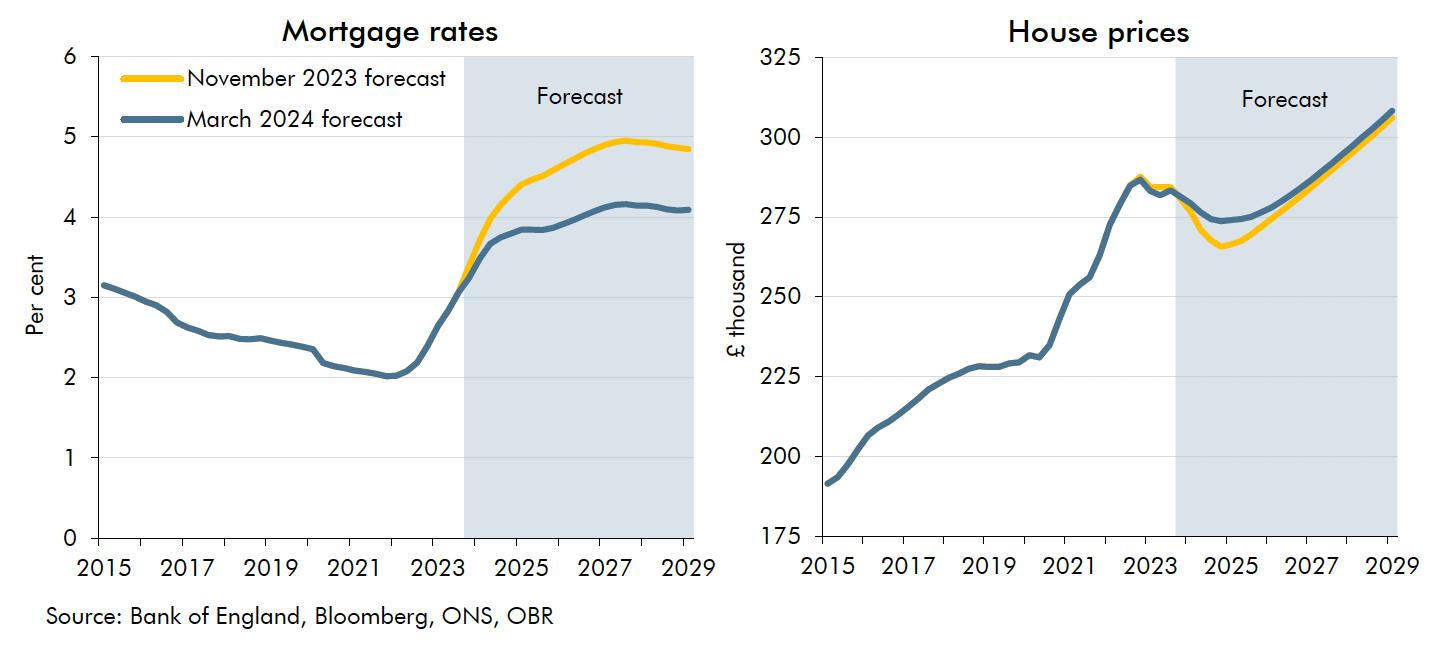A sluggish but benign outlook
Making sense of the latest trends in property and economics from around the globe
5 minutes to read
The annual rate of inflation will drop back to 2% in the second quarter of this year, paving the way for the Bank of England to cut the base rate to 4.2% by the end of the year, down from where it stands today at 5.25%, according to Office for Budget Responsibility forecasts published alongside the budget on Wednesday.
That means inflation will reach the Bank's 2% target a year earlier than than the OBR expected only five months ago, underlining the degree to which economic conditions have improved in a short period of time.
Granted, there is plenty in the forecast to worry about if you're so inclined, but there's little doubt that the sluggish but benign nature of the outlook will underpin stability in the housing market and beyond. It really is all relative: the 2022-2023 period was the largest year-on-year drop in living standards since official records began in the 1950s. However, the OBR now expects real household income per person to reach its pre-pandemic peak by 2025-26, two years earlier than the group expected as recently as November.
The housing market
The OBR expects house prices to fall 2% this year, while transactions will remain broadly flat. That compares to a 5% fall in house prices and a 7% fall in transactions in the November forecast.
The group then expects house price growth to accelerate to 2% by 2026 and 3.5% in 2027 and 2028. That would mean house prices pass the previous peak in the first quarter of 2027.
A reminder that we expect mainstream UK house prices to climb 3% this year. House prices have now risen for five consecutive months, Halifax reported yesterday. The 0.4% gain in February brings the annual rate of growth to 1.7%.

Policy
It was a bitty budget with few big property headlines, but there were several tweaks that reveal how the Conservatives view the priorities for the housing market.
Tom Bill has a good round up here. Anna Ward considers the new homes angles here. From next month, the higher capital gains tax (CGT) rate on residential property will fall to 24%, from 28%. The government says the move will raise money by boosting transactions. A tax loophole for landlords of holiday lets will also be closed in an effort to turn more of these properties into long-term lets.
The multiple dwellings relief (MDR) for stamp duty will also be abolished this year. The rules mean that stamp duty relief can be claimed when buying more than one property. The so-called ‘rule of 6’ will continue to apply, which means the purchase of six or more dwellings in a single transaction will continue to be taxed at commercial rates. There was previously a choice as to whether the buyer treated these six-plus deals as commercial or residential with MDR.
“Where six or more dwellings are purchased, the tipping point where it is generally better to pay stamp duty at the commercial rates is where the average price per dwelling is £250,000 or more," says Sean Randall, stamp duty partner at Blick Rothenberg. “Below that threshold, at a time when the government is trying to ensure the delivery of more homes, it is an anomaly of the new rules that investors in build-to-rent and student accommodation schemes, for example, could now pay more stamp duty, swapping an effective tax rate as low as 1% for one that’s almost 5%.”
Non doms
Non-dom rules will be scrapped from next April. To date, those with non-dom status have not paid tax on their worldwide income for up to 15 years under a fairly complex set of rules, making the UK somewhat of a global outlier, Tom writes.
From next year, new arrivals will pay nothing for four years before paying the same as other UK residents, a simplification the government has said will raise £2.7 billion a year by 2028/29. That outflanks Labour, which had pledged to reform the rules if it wins power. The FT has a piece that includes quotes from non-doms and their advisors suggesting some will leave for Switzerland or Italy. This is a risk for any policy targeting this relatively footloose group, but people are generally in the UK for reasons that extend well beyond their tax affairs.
That's not to diminish the importance of these kinds of changes, which one FT respondent compares to changing the rules mid-game. Indeed, we covered this issue in detail in The Wealth Report 2024 as part of a look at the upcoming election and the challenges facing London as a global wealth hub. While scrapping the non-dom rules itself won't come with huge consequences, some international investors say they feel unwelcome:
“People are concerned about the government and in particular about any changes that might make big overseas investors feel unwelcome,” Paddy Dring, Knight Frank's Global Head of Prime Sales told the Wealth Report. “Feeling welcome is important. Clients use those words and I think it’s important that a new government conveys that Britain still values international investment.”
In other news...
From student bed shortages to net zero dilemmas in property redevelopment, our latest episode of Intelligence Talks provides a snapshot of the UK’s housing landscape. The living sectors alone can’t fix Britain’s housing crisis, but momentum is building. The country needs more decent and well managed private-rented housing, as well as more options for students and seniors.
Anna is joined by Lizzie Breckner, Katie O'Neill and Sam Heffron. They discuss how quickly BTR could scale up to deliver more of Britain’s housing supply, why students are facing an ‘existential crisis’ when it comes to property options, and what would convince older generations to downsize from family-sized homes. Listen here, or wherever you get your podcasts.